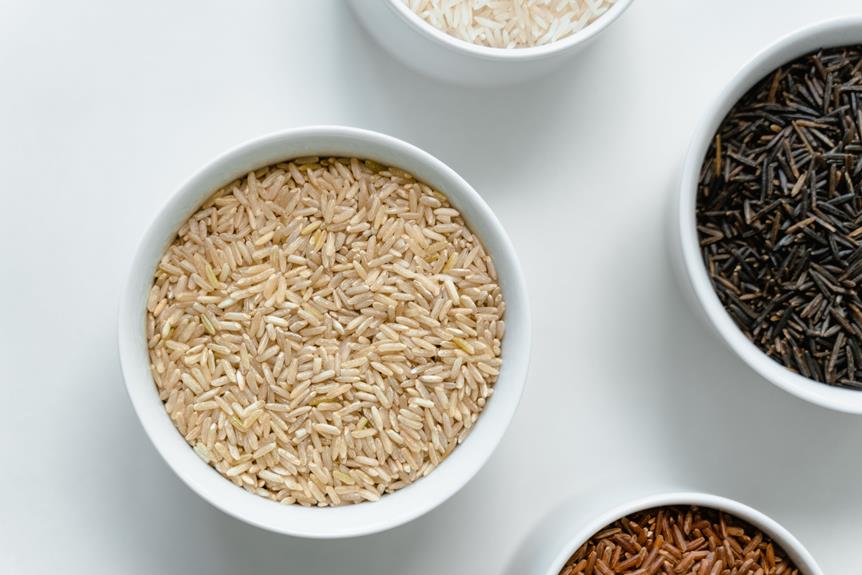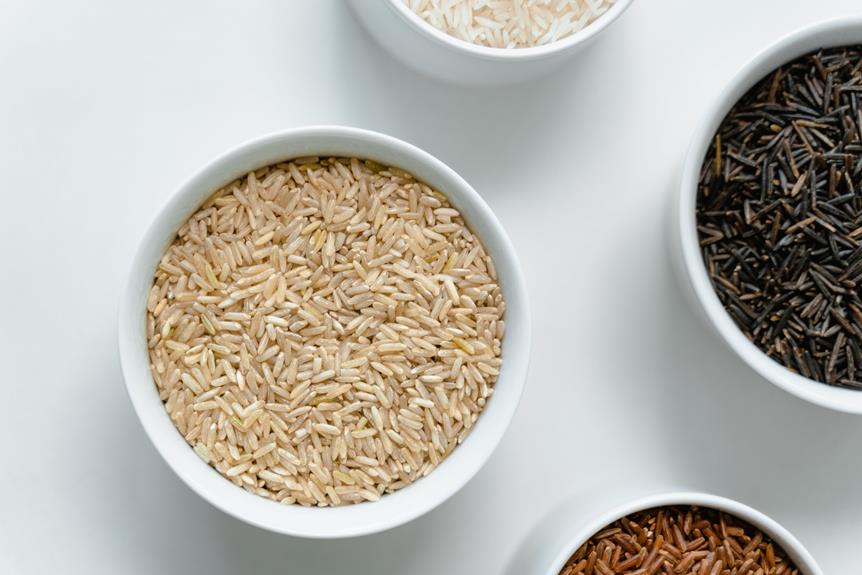You may think of dietary fiber as just another component of your diet, but its impact on your gut health is far more significant than you might imagine. From aiding digestion to promoting a healthy gut lining, dietary fiber plays a crucial role in maintaining your overall well-being. But how exactly does it affect your gut bacteria? And what are the benefits of incorporating more fiber into your diet? In this discussion, we will uncover the untapped potential of dietary fiber, providing insights into its impact on gut health that may surprise you. Stay tuned to discover the secrets behind unlocking the true power of dietary fiber.
Key Takeaways
- Dietary fiber promotes regular bowel movements, supports beneficial gut bacteria, and reduces the risk of gastrointestinal disorders.
- Fiber-rich foods like fruits, vegetables, and whole grains are essential for gut health and overall well-being.
- Soluble fiber lowers cholesterol and regulates blood sugar, while insoluble fiber prevents constipation and adds bulk to stool.
- Fiber acts as a prebiotic, enhancing gut motility, feeding beneficial gut bacteria, and reducing inflammation levels.
Types of Dietary Fiber
What are the different types of dietary fiber and how do they impact gut health? When it comes to dietary fiber, there are two main types: soluble fiber and insoluble fiber. Soluble fiber dissolves in water and forms a gel-like substance in the digestive tract. This type of fiber can help to lower cholesterol levels and regulate blood sugar levels. It also plays a role in improving gut health by providing nourishment to the beneficial bacteria in the gut. Insoluble fiber, on the other hand, does not dissolve in water. It adds bulk to the stool and helps to prevent constipation by promoting regular bowel movements. This type of fiber also aids in maintaining a healthy gut by speeding up the passage of food through the digestive system, reducing the risk of certain digestive disorders.
In addition to soluble and insoluble fiber, there is also a third type called resistant starch. Resistant starch is a type of carbohydrate that resists digestion in the small intestine. Instead, it travels to the large intestine where it serves as a source of food for the beneficial bacteria. This type of fiber has been shown to have numerous health benefits, such as improving insulin sensitivity and reducing the risk of colon cancer.
Each type of dietary fiber plays a unique role in gut health. Soluble fiber nourishes the gut bacteria, while insoluble fiber adds bulk to the stool and promotes regular bowel movements. Resistant starch acts as a prebiotic and supports the growth of beneficial bacteria in the gut. By including a variety of these fiber types in your diet, you can optimize your gut health and support overall digestive wellness.
Role of Dietary Fiber in Digestion
Dietary fiber plays a crucial role in digestion by promoting regular bowel movements and maintaining a healthy gut. Here's how it works:
- Increased stool bulk: Fiber adds bulk to your stool, making it easier to pass through your digestive system. This helps prevent constipation and promotes regular bowel movements.
- Improved digestion: Fiber acts like a sponge, absorbing water and softening your stool. This makes it easier for your body to break down and absorb nutrients from food.
- Enhanced gut motility: Fiber stimulates the muscles in your intestines, promoting the movement of food through your digestive system. This helps prevent bloating and discomfort, keeping your gut healthy and functioning properly.
- Feeding beneficial gut bacteria: Fiber serves as a source of nourishment for the good bacteria in your gut. These bacteria ferment fiber, producing short-chain fatty acids that provide energy for the cells lining your intestines. This helps maintain a healthy gut environment and supports overall digestive health.
How Dietary Fiber Affects Gut Bacteria
The consumption of dietary fiber has a profound impact on the composition and activity of gut bacteria. When you include fiber in your diet, it serves as a valuable source of nutrition for the beneficial bacteria in your gut. These bacteria break down the fiber into short-chain fatty acids (SCFAs), such as butyrate, acetate, and propionate. SCFAs play a crucial role in maintaining the health of your gut and overall well-being.
Fiber acts as a prebiotic, which means it provides nourishment for the beneficial bacteria in your gut. These bacteria ferment the fiber, producing SCFAs as a byproduct. This process helps to maintain a balanced and diverse gut microbiota, which is essential for optimal gut health. A healthy gut microbiota has been linked to various health benefits, including improved digestion, enhanced immune function, and reduced risk of chronic diseases such as obesity, diabetes, and cardiovascular disease.
The SCFAs produced by gut bacteria have several important functions. Butyrate, in particular, has been extensively studied for its role in promoting colon health. It acts as a fuel source for the cells lining the colon, helping to maintain their integrity and function. Additionally, SCFAs help regulate the pH level in the gut, creating an environment that is favorable for beneficial bacteria and inhibiting the growth of harmful pathogens.
Benefits of Dietary Fiber for Bowel Movements
Including dietary fiber in your daily intake can have significant benefits for your bowel movements. Here are some reasons why:
- Promotes regularity: Dietary fiber adds bulk to your stool, making it easier to pass through your digestive system. This can help prevent constipation and promote regular bowel movements.
- Improves stool consistency: Fiber adds moisture to your stool, making it softer and easier to pass. This can be especially helpful if you struggle with hard, dry stools.
- Reduces the risk of hemorrhoids: Hemorrhoids are swollen blood vessels in the rectal area that can be painful and uncomfortable. By promoting regular bowel movements and preventing constipation, dietary fiber can reduce the risk of hemorrhoids.
- Supports a healthy gut: Dietary fiber acts as a prebiotic, providing nourishment for the beneficial bacteria in your gut. These bacteria play a crucial role in maintaining a healthy digestive system and can contribute to overall gut health.
By incorporating fiber-rich foods into your diet, such as fruits, vegetables, whole grains, and legumes, you can experience these benefits for your bowel movements. Aim to consume the recommended daily intake of fiber, which is 25 grams for women and 38 grams for men.
Remember to increase your fiber intake gradually and drink plenty of water to help your body adjust to the changes. If you have any underlying medical conditions or are taking medications, it's always a good idea to consult with your healthcare provider before making significant dietary changes.
In the next subtopic, we will discuss in more detail how dietary fiber can help prevent constipation and promote overall digestive health. Stay tuned!
Dietary Fiber and Prevention of Constipation
To prevent constipation, incorporating dietary fiber into your daily intake is essential. Dietary fiber plays a crucial role in maintaining regular bowel movements and preventing the discomfort associated with constipation. When you consume foods rich in fiber, it adds bulk to your stool, making it easier to pass through your digestive system. This helps to prevent the stool from becoming hard and dry, which can lead to constipation.
Fiber can be classified into two types: soluble and insoluble. Soluble fiber dissolves in water and forms a gel-like substance in your digestive tract. It helps to soften the stool and adds moisture, preventing constipation. Good sources of soluble fiber include oats, barley, legumes, and fruits like apples and citrus fruits. On the other hand, insoluble fiber does not dissolve in water and adds bulk to the stool. It helps to promote regular bowel movements by stimulating the muscles in the digestive tract. Foods rich in insoluble fiber include whole grains, vegetables, and nuts.
Incorporating more fiber-rich foods into your diet can help prevent constipation. Aim to include a variety of fruits, vegetables, whole grains, and legumes in your meals. Start your day with a bowl of high-fiber cereal or oatmeal topped with fresh fruits. Include vegetables like broccoli, spinach, and carrots in your lunch and dinner. Snack on nuts, seeds, and dried fruits to increase your fiber intake throughout the day. Additionally, make sure to drink plenty of water as fiber absorbs water and helps to soften the stool.
Impact of Dietary Fiber on Gut Inflammation
Incorporating dietary fiber into your daily intake can have a significant impact on reducing gut inflammation. The role of dietary fiber in promoting a healthy gut extends beyond preventing constipation. Here are four ways in which dietary fiber can help reduce gut inflammation:
- Increasing beneficial gut bacteria: Dietary fiber acts as a prebiotic, providing nourishment for the beneficial bacteria in your gut. These bacteria produce short-chain fatty acids (SCFAs), such as butyrate, which have anti-inflammatory properties. By promoting the growth of these beneficial bacteria, dietary fiber helps to reduce gut inflammation.
- Regulating the immune system: A healthy gut depends on a well-regulated immune system. Dietary fiber helps modulate the immune response in the gut, preventing excessive inflammation. It promotes the production of regulatory T cells, which are crucial for maintaining immune balance and reducing gut inflammation.
- Enhancing gut barrier function: The gut lining serves as a barrier between the contents of the gut and the rest of the body. Dietary fiber plays a role in maintaining the integrity of this barrier. It helps to strengthen the gut lining by promoting the production of mucins, which are protective proteins that line the gut wall. A strong gut barrier prevents the entry of harmful substances into the body and reduces gut inflammation.
- Reducing oxidative stress: Oxidative stress is a condition characterized by an imbalance between the production of free radicals and the body's ability to neutralize them. This imbalance can lead to inflammation. Dietary fiber, particularly soluble fiber, has antioxidant properties that help reduce oxidative stress and alleviate gut inflammation.
Dietary Fiber's Role in Promoting Healthy Gut Lining
Dietary fiber plays a crucial role in promoting a healthy gut lining. It acts as a protective barrier, preventing harmful substances from entering the bloodstream and causing inflammation. Additionally, fiber promotes the growth of beneficial gut bacteria, which further enhances the overall health of the gut. By incorporating fiber-rich foods into your diet, you can reduce inflammation levels and support a well-functioning gut.
Gut Lining Protection
Promote a healthy gut lining by incorporating dietary fiber into your daily meals. Dietary fiber plays a crucial role in protecting and maintaining the health of your gut lining. Here are four ways that dietary fiber helps to enhance gut lining protection:
- Increases mucus production: Dietary fiber acts as a prebiotic, stimulating the growth of beneficial gut bacteria that produce mucus. This mucus acts as a protective barrier, preventing harmful substances from damaging the gut lining.
- Provides nourishment for gut cells: Fiber is fermented by gut bacteria, producing short-chain fatty acids (SCFAs). These SCFAs provide energy and nourishment to the cells of the gut lining, helping to maintain their integrity and function.
- Reduces inflammation: Fiber-rich foods contain anti-inflammatory properties that help to reduce inflammation in the gut. This can prevent damage to the gut lining and promote a healthy gut environment.
- Promotes regular bowel movements: Adequate fiber intake helps to prevent constipation and promote regular bowel movements. This reduces the contact time between harmful substances and the gut lining, minimizing the risk of damage.
Enhanced Gut Microbiome
To further support the health of your gut lining, understanding how dietary fiber enhances the gut microbiome is essential. The gut microbiome refers to the trillions of bacteria and other microorganisms that reside in your digestive tract. These microorganisms play a crucial role in maintaining a healthy gut lining and overall digestive function. Dietary fiber serves as a source of nourishment for these beneficial gut bacteria, allowing them to thrive and multiply. As they break down the fiber, they produce short-chain fatty acids, such as butyrate, which has been shown to have numerous health benefits for the gut lining. These fatty acids provide energy to the cells lining your intestine, promoting their growth and strengthening the integrity of the gut barrier. By enhancing the gut microbiome, dietary fiber helps to maintain a healthy gut lining and improve overall gut health.
Reduced Inflammation Levels
How does dietary fiber contribute to reducing inflammation levels and promoting a healthy gut lining? Here are some ways:
- Increases production of short-chain fatty acids (SCFAs): Dietary fiber serves as a food source for beneficial gut bacteria, which produce SCFAs like butyrate. SCFAs promote a healthy gut lining by reducing inflammation and providing energy to intestinal cells.
- Improves gut barrier function: Dietary fiber helps strengthen the gut barrier by increasing the production of mucus and tight junction proteins. This prevents harmful substances from leaking into the bloodstream and triggering inflammation.
- Modulates immune response: Fiber-rich foods can regulate the immune system, reducing excessive inflammation in the gut. This helps maintain a balanced immune response and protects against chronic inflammation.
- Promotes the growth of beneficial gut bacteria: Fiber acts as a prebiotic, nourishing beneficial gut bacteria. These bacteria play a crucial role in reducing inflammation and maintaining a healthy gut lining.
How Dietary Fiber Supports Weight Management
Incorporating dietary fiber into your daily meals and snacks can play a vital role in supporting your weight management goals. Fiber-rich foods not only provide a feeling of fullness but also have a low caloric density, making them an excellent choice for those looking to maintain or lose weight. Let's dive into how dietary fiber supports weight management.
One way fiber aids in weight management is by promoting satiety. When you consume foods high in fiber, such as fruits, vegetables, and whole grains, they take longer to digest, keeping you feeling fuller for longer. This can help prevent overeating and unnecessary snacking, ultimately supporting weight control.
Another benefit of dietary fiber is its impact on calorie absorption. Fiber-rich foods often require more chewing, which slows down the eating process. Additionally, fiber bulks up the contents of your stomach, leading to a slower release of nutrients and a reduced spike in blood sugar levels. By slowing down digestion, fiber helps control appetite and prevents rapid weight gain.
To better understand how dietary fiber supports weight management, let's take a look at the table below:
| Fiber-Rich Foods | Caloric Density |
|---|---|
| Fruits | Low |
| Vegetables | Low |
| Whole grains | Low |
As you can see, fiber-rich foods have a low caloric density, meaning they provide fewer calories per gram compared to other foods. This makes them an excellent choice for weight management, as you can consume a larger volume of food without exceeding your calorie intake.
Incorporating fiber into your diet is an effective strategy for weight management. By promoting satiety and controlling calorie absorption, fiber helps you achieve your weight goals while maintaining a healthy and balanced diet.
Dietary Fiber and Its Impact on Nutrient Absorption
Dietary fiber plays a crucial role in the absorption of nutrients within your body. It not only aids in digestion but also affects how your body absorbs essential vitamins and minerals. Here are four ways in which dietary fiber impacts nutrient absorption:
- Increases nutrient transit time: Fiber adds bulk to your stool, which helps move food through your digestive system more efficiently. This increased transit time allows for better nutrient absorption as your body has more time to break down and extract essential nutrients from the food you consume.
- Enhances mineral absorption: Certain types of dietary fiber, such as soluble fiber, can bind to minerals like calcium, iron, and zinc. This binding process can improve their absorption by preventing them from being excreted in the feces. As a result, more minerals are made available for your body to utilize.
- Reduces cholesterol absorption: Soluble fiber has the ability to bind with bile acids in your digestive system, which are made from cholesterol. By binding to bile acids, fiber helps to lower cholesterol levels by promoting its excretion. This process indirectly impacts nutrient absorption by improving the efficiency of bile acid production, which is necessary for the absorption of fat-soluble vitamins.
- Regulates blood sugar levels: Dietary fiber, particularly soluble fiber, slows down the absorption of glucose from the foods you eat. This slower absorption helps to stabilize your blood sugar levels, preventing spikes and crashes. By maintaining stable blood sugar levels, your body can better regulate the absorption and utilization of nutrients, such as carbohydrates.
Incorporating dietary fiber into your diet is essential for optimal nutrient absorption. The benefits of fiber extend beyond digestion and can have a significant impact on your overall health and well-being.
Importance of Incorporating Dietary Fiber Into Your Diet
Incorporating dietary fiber into your diet is crucial for maintaining a healthy balance of gut microbiota, promoting optimal digestive system health, and preventing various diseases. Fiber acts as a prebiotic, nourishing the beneficial bacteria in your gut and contributing to a diverse and thriving microbiome. Additionally, fiber aids in regulating bowel movements, preventing constipation, and reducing the risk of developing conditions such as hemorrhoids and diverticulosis.
Gut Microbiota Balance
To maintain a healthy gut microbiota balance, it is essential to include an adequate amount of fiber in your daily diet. Fiber plays a crucial role in promoting the growth of beneficial bacteria in your gut, which helps to improve digestion and overall gut health. Here are four reasons why incorporating dietary fiber into your diet is important:
- Fiber acts as a prebiotic, providing nourishment for the good bacteria in your gut.
- It helps to regulate bowel movements and prevent constipation.
- Fiber aids in weight management by promoting feelings of fullness and reducing calorie intake.
- It helps to lower the risk of developing chronic diseases, such as heart disease, diabetes, and certain types of cancer.
Digestive System Health
Maintaining a healthy digestive system is crucial, and one effective way to do so is by including an adequate amount of dietary fiber in your daily meals. Dietary fiber plays a vital role in promoting digestive system health by providing bulk to your stool and preventing constipation. It helps regulate bowel movements and promotes regularity, keeping your digestive system functioning smoothly. Additionally, dietary fiber acts as a prebiotic, promoting the growth of beneficial gut bacteria and improving gut microbiota balance. This, in turn, supports overall digestive health and can reduce the risk of gastrointestinal disorders such as inflammatory bowel disease. By incorporating sources of dietary fiber, such as fruits, vegetables, whole grains, and legumes, into your diet, you can support a healthy digestive system and enjoy the numerous benefits it brings.
Disease Prevention
Including an adequate amount of dietary fiber in your daily meals is essential for preventing diseases and maintaining overall health. Here are four important reasons why you should incorporate dietary fiber into your diet:
- Heart Health: Dietary fiber helps lower cholesterol levels and reduce the risk of heart disease. It can also regulate blood pressure and prevent the buildup of plaque in the arteries.
- Weight Management: High-fiber foods are often low in calories and can help you feel full for longer. By including fiber in your diet, you can manage your weight more effectively and reduce the risk of obesity.
- Type 2 Diabetes Prevention: Fiber-rich foods help regulate blood sugar levels and improve insulin sensitivity. This can lower the risk of developing type 2 diabetes and help manage the condition for those already diagnosed.
- Digestive Health: Dietary fiber promotes regular bowel movements, prevents constipation, and reduces the risk of developing hemorrhoids and diverticulitis.
Frequently Asked Questions
Can a Lack of Dietary Fiber Cause Gut Health Issues?
A lack of dietary fiber can indeed cause gut health issues. When you don't consume enough fiber, your digestive system may struggle to function properly. This can lead to constipation, bloating, and discomfort. Fiber plays a crucial role in regulating bowel movements and keeping your digestive system healthy. It adds bulk to your stools and helps them pass through your intestines more easily. So, make sure to include fiber-rich foods in your diet to maintain good gut health.
How Does Dietary Fiber Affect the Diversity of Gut Bacteria?
Dietary fiber plays a crucial role in diversifying your gut bacteria. It provides nourishment to the beneficial bacteria in your gut, helping them thrive and multiply. This, in turn, leads to an increase in the overall diversity of your gut microbiome. When you consume enough fiber, it acts as a prebiotic, promoting the growth of good bacteria and creating a healthier gut environment. So, make sure to include fiber-rich foods in your diet for a flourishing gut microbiota.
Does Dietary Fiber Have Any Impact on Gut Inflammation?
Dietary fiber can indeed have an impact on gut inflammation. When you consume enough fiber, it helps to regulate your digestive system and maintain a healthy balance of gut bacteria. This, in turn, reduces the risk of inflammation in your gut. Fiber acts as fuel for beneficial gut bacteria, promoting their growth and inhibiting harmful bacteria. So, by incorporating fiber-rich foods into your diet, you can potentially reduce gut inflammation and promote overall gut health.
Can Dietary Fiber Help in Preventing Weight Gain?
Can dietary fiber help prevent weight gain? Yes, it can. Fiber adds bulk to your diet, making you feel fuller for longer and reducing your overall calorie intake. It also slows down the digestion process, allowing for better nutrient absorption and stable blood sugar levels. Additionally, fiber promotes healthy gut bacteria, which can aid in weight management. Including fiber-rich foods like fruits, vegetables, whole grains, and legumes in your diet is a simple and effective way to support weight control.
Is There a Specific Amount of Dietary Fiber Recommended for Optimal Gut Health?
There isn't a specific amount of dietary fiber recommended for optimal gut health. However, incorporating a variety of fiber-rich foods into your diet can promote a healthy gut. Foods like fruits, vegetables, whole grains, and legumes are all good sources of fiber. Aim to include these foods in your meals to support a balanced and thriving gut microbiome. Remember, it's about overall dietary patterns and not just single nutrients when it comes to gut health.




